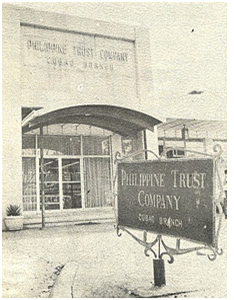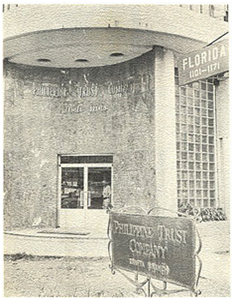Philtrust Bank, formerly known as Philippine Trust Company (PTC) was founded on October 21, 1916 and considered as one of the oldest private bank in the Philippines. It started with an initial authorized capital of P 1.0 million, half of which was paid up and established its first office at Calle T. Pinpin, Escolta, Manila.
The First Board of directors as composed of Messrs. Phil C. Whitaker, Otto Vorster, Charles Ayton, Julius S. Reis, Thomas L. Hartigan, William J. O'Donovan and W. H. Lawrence. Mr. Whitaker was elected president and served for more than six years.

Anchored to its commitment of providing service to this community, it became the first bank to estate administration and guardianship services. The fiduciary and trust services of the bank ignited the emergent reliance and confidence vested to it by the public. It came as no surprise then that after World War I the company was engaged by the United States Veterans Administration or the Veterans Bureau to handle guardianship of deceased Veteran's children. It also became the depository of the United States Armed Forces, the US Army stationed in the Philippines including General Douglas MacArthur and his men and the Philippine Scouts.
The company's trust business grew steadily though the years that in 1919 it declared its first cash dividends. In the same year the stockholders amended its Articles of Incorporation to expand its operation to include savings and commercial banking activities. The following year, September 1920, Philippine Trust Company moved to its new office near the Sta. Cruz Catholic Church at the foot of Sta. Cruz Bridge (renamed MacArthur Bridge Later). Among its first depositors are Manual L. Quezon, Manual C. Briones, Jose C. Zulueta, Roman Mabanta and Eulogio Rodriguez Sr. all prominent Filipinos and movers in Philippine history.
In a short span of time the company assumed leading role in banking with its conservative policies as the hallmark of its operation. Its corporate maxim of minimum risk to its clients and absolute protection of depositors' funds endeared the bank to its growing clientele.
After World War II, the government through the Rehabilitation Finance Corporation (RFC) infused financial aid to the industry in the form of preferred shares. As one of the beneficiaries of such government initiative, Philippine Trust Company's authorized capital was increased to P3 million and its paid up capital to P2 million, P1 million common shares to existing stockholders and P1 million in preferred shares to RFC. The RFC investment was eventually paid by the company in later years.
In 1950, Philippine Trust Company under an arrangement with the Archdiocese of Manila, built a five (5) storey air-conditioned building at the back of Sta. Cruz Catholic Church in front of Plaza de Goiti (now Plaza Lacson) to serve as its new office. The bank in its desire to bring the banking services nearer to the public that they serve, established branches in Manila specifically Ermita and Paco and Cubao in Quezon City.

On October 17, 1978, Don Emilio T. Yap took over as owner of Philtrust Bank, when the Roman Catholic Archbishop of Manila (RCAM), the principal stockholder of the bank, sold its controlling shares of stocks to Mr. YAP. Then RCAM, Jaime Cardinal Sin, favored Mr. Yap because of his firm belief that "he could maintain the trust and confidence of bank's clients and would greatly contribute to the growth, stability and success of the Bank."
Ten years later, in 1988, Philtrust Bank shares were listed with Makati and Manila Stock exchanges. By 2007, the Bangko Sentral ng Pilipinas granted a universal banking license to the Bank. Likewise, the Securities and Exchange Commission (SEC) approved the registration of amendment to its Articles of Incorporation to include among its powers, to engage in the business of expanded commercial baking as a universal bank, to carry on the business of a trust company, exercise the power and authority to invest in the equity of allied and non-allied corporations, business undertaking, and to perform such other acts and functions as may permitted by law.
The Bank's head office is now located along United Nations Avenue cor. San Marcelino and Romualdez Sts. in Manila. It maintains branches in Metro Manila and in prominent cities and municipalities in the islands of Luzon, Visayas and Mindanao.
Philtrust Bank through the years had maintained its image as a conservative bank that puts premium to protecting the interest of its clients under any kind of economic or business environment, a lasting reputation stability and a tradition of delivering quality service to the public. A heritage nurtured through the years.